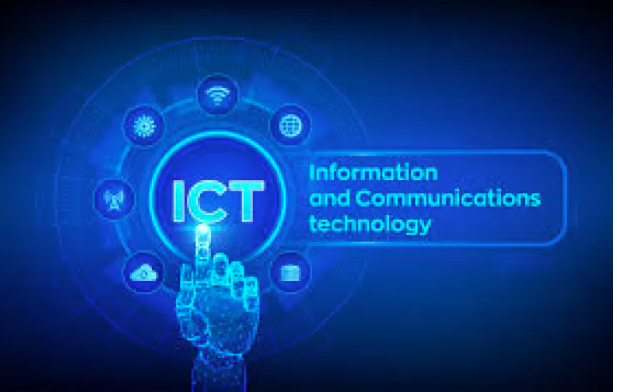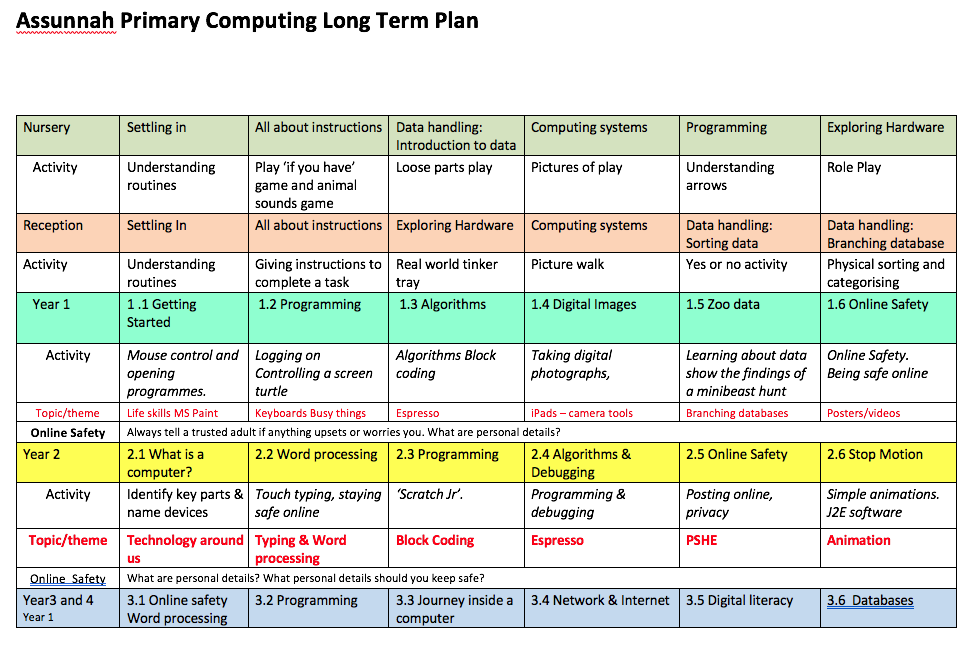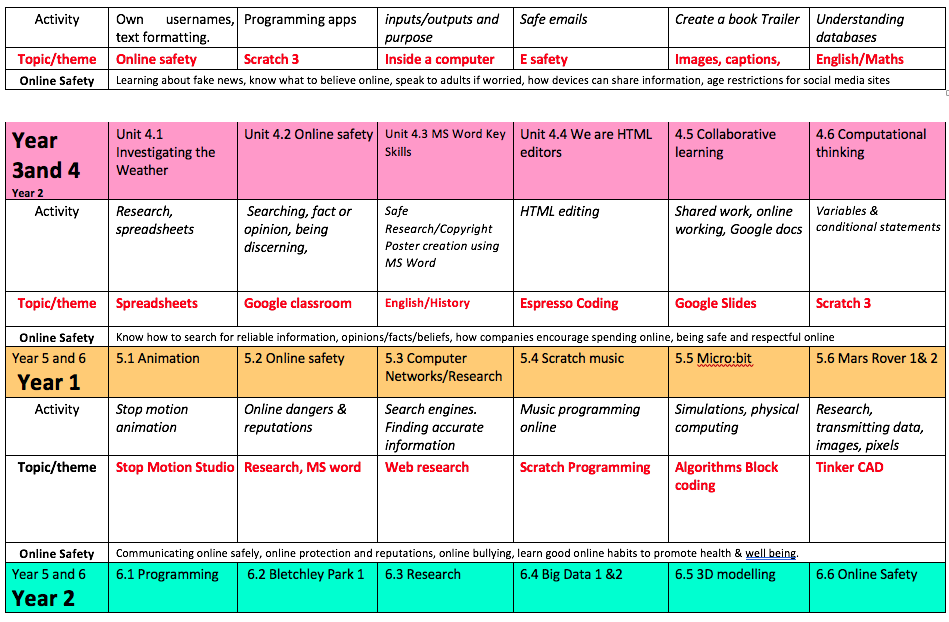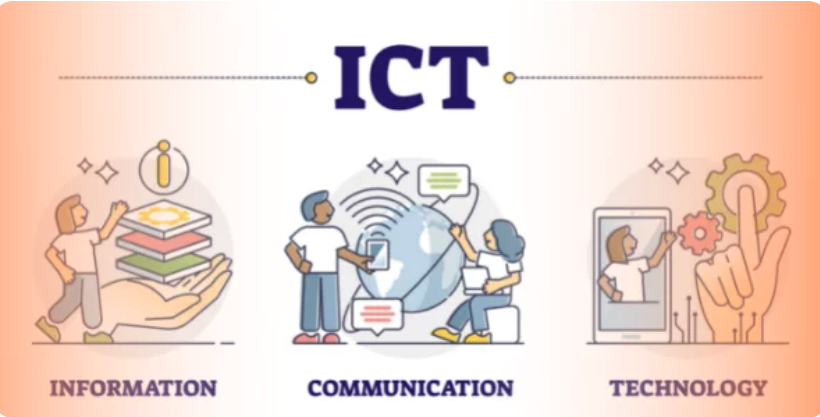Overview:
Computers are now part of everyday life. Technology is essential to our lives, at home and at work for most of us. ‘Computational thinking is a skill child at Assunnah Primary School must be taught if they are to be ready for the workplace and able to participate effectively in this digital world.
Digital literacy
Digital literacy forms the backbone of the ICT curriculum at Assunnah Primary School. Children develop ICT skills that can thoughtfully be applied in different situations, with children developing increasing independence in the choices they make over which technology to use to help them reach the desired outcome. As they progress through KS1 and KS2, children will become increasingly confident in applying their digital skills, becoming increasingly efficient and effective communicators, collaborators and analysts, showing imagination and creativity in their use of ICT in different aspects of their learning and life beyond school.

Technology in the world
Children should develop an understanding of how technology makes a difference in all aspects of life- at home, at school and in the workplace, as well as considering the impact technology has had on society over the years.
Children will, for example, develop an awareness of how different technology is used in the world around us (KS1) and begin to evaluate web pages, software and applications and use this evaluation in the planning of their digital resources.
Technical understanding
Children develop the knowledge and understanding of how technology works.
This extends from an awareness that there is ‘something inside’ a piece of technology to make it work; for example, Year Three will explore how a computer is made of different components, learning about graphics processors and Central Processing Units—progressing through KS1 and KS2 to children creating their own simple programs including games and applications with exposure to computer codes and scripts.
Online Safety
Online safety is a fundamental element of ICT teaching and technology. We have a separate Online Safety policy, and Online Safety sessions take place at the beginning of every new unit of Computing and in RSE lessons.
At Assunnah Primary School, children have weekly lessons using laptops. We use the published scheme ‘Kapow Primary’. In this scheme, children at Assunnah Primary School will learn how computers and computer systems work; they will design and build programs, develop their ideas using technology and create a range of content.
After implementing the computing curriculum, children at Assunnah Primary School will be digitally literate and able to join the rest of the world on its digital platform. They will be equipped, not only with the skills and knowledge to use technology effectively and for their own benefit, but more importantly – safely.

Assunnah Primary School Computing Policy
Knowledge for Righteous Action
Assunnah Values – Faithfulness Tolerance, Patience, Respect Gratitude Justice Responsibility British Values – Democracy, Rule of Law, Individual Liberty, Tolerance and Respect
Intent
A high-quality computing education equips pupils to use computational thinking and creativity to understand and change the world. Computing has deep links with mathematics, science, design and technology, and provides insights into both natural and artificial systems. The core of computing is computer science, in which pupils are taught the principles of information and computation, how digital systems work, and how to put this knowledge to use through programming. Building on this knowledge and understanding, pupils are equipped to use information technology to create programs, systems and a range of content. Computing also ensures that pupils become digitally literate – able to use, and express themselves and develop their ideas through, information and communication technology – at a level suitable for the future workplace and as active participants in a digital world.
A Curriculum for our pupils
We are a small school in an area of deprivation and many of our pupils come from homes where there are challenges of low income and social deprivation. Therefore, we ensure that the teaching of computing provides all children with opportunities to develop a wide range of fundamental skills, knowledge and understanding that will actually equip them for the rest of their life. Computers and technology are such a part of everyday life that our children would be at a disadvantage if they are not exposed to a thorough and robust
Computing curriculum. Children must be taught ‘Computational Thinking’ in order to provide the essential knowledge that will enable them to participate effectively and safely in the digital world.
Computing in schools can therefore provide a wealth of learning opportunities and transferrable skills essential in the computing lesson and across other curriculum subjects.
Our computing curriculum enables children to become effective users of technology who can:
- Understand and apply the essential principles and concepts of Computer Science, including logic, algorithms and data representation;
- Analyse problems in computational term, and have repeated practical experience of writing computer programs in order to solve such problems;
- Evaluate and apply information technology analytically to solve problems;
- Communicate ideas well by utilising appliances and devices throughout all areas of the curriculum.
Our computing curriculum takes into account the wide range of abilities in the classroom and ensures that appropriate support and resources are in place to ensure all children, where possible, can access the lesson objectives and excel at an age-appropriate level.
A curriculum of breadth and wider opportunity
At Assunnah Primary School, our computing curriculum is a curriculum of breadth and ambition. Our curriculum delivers the EYFS Framework and statutory National Curriculum through the
Kapow scheme of work and is the basis for our planning. We ensure that Kapow suits the individual needs of our pupils and narrows the gaps in their knowledge and skills.
Progressive, well-sequenced learning that embeds knowledge
Our Computing curriculum is based on developing the six elements of computing: Digital literacy; Computers and hardware; Online safety; Cross-curricular application; Computational thinking and Coding. Computing lessons are planned systematically so that there is a carefully sequenced journey through their school life of the elements and skills being taught. This is built through small progressive steps. However, due to our mixed classes in Year 3and 4 and Year 5 and 6. It is planned as two-year rolling programme.
A curriculum that develops character
Our Computing curriculum enables our pupils to develop into confident computational thinkers who are able to work with others. It helps them to develop respect and perseverance. The Computing curriculum is essential for pupils’ life choices and skills are developed to enable them to access the computing world safely.

Our Computing curriculum maximises the opportunities for pupils to build on prior learning. Their knowledge content is repeated and revisited to ensure that pupils know more and remember more. As a result, as they move through school the pupils make connections to skills previously taught, which leads to further learning and develops new skills.
As pupils develop knowledge, they need to practice and master skills which is why the knowledge and skills, which pupils have previously gained, is recapped and reinforced. There are clear cross-curricular links throughout the Kapow scheme to other academic subjects, such as maths and science.
A curriculum where reading is a priority
Reading has the highest priority at Assunnah Primary. Our computing curriculum provides children with opportunities to apply their reading skills through research on the internet and the application of digital programs. Their ability to read is integral to enabling their full access to the opportunities computer networks offer for communication and collaboration. The challenges of discerning and evaluating digital content rely upon the reading ability of the pupil. Sequencing, analysis and evaluation are key skills in computing which support and practise reading and comprehension objectives.

A curriculum that develops character
Our computing curriculum enables our pupils to develop into confident learners who are able to communicate and express their feelings and ideas freely, which reinforces our values.
At Assunnah Primary, computing empowers pupils to embed the Assunnah values of patience and tolerance as pupils are required to work and communicate with others, and to keep themselves and others safe. This is a programme which teaches children to think rationally and logically and so develops their ability to make sense of their thoughts and communications and to cooperate rationally with others.
Inclusion and access to the Computing curriculum
At Assunnah Primary School all children have an entitlement to a broad and balanced curriculum, which is differentiated to enable our children to:
- understand the relevance and purpose of all learning activities;
- experience levels of understanding and rates of progress that bring feelings of success and achievement;
- maximise achievement for all pupils, including pupils with Special Educational Needs and Disabilities (SEND) and children whose first language is not English, by addressing barriers to learning.
Staff at Assunnah Primary School take into account that pupils have different educational and behavioural needs and aspirations; require different strategies for learning; acquire, assimilate and communicate information at different rates; and need a range of different teaching approaches and experiences. In Computing staff make appropriate curricular provision to respond to children’s needs by:
- planning for all children’s full participation in learning;
- differentiating teaching and learning to recognise individual needs;
- providing support for children who require it to access the curriculum;
- taking into account the specific needs of pupils with SEND and the targets set for them as identified in their Pupil Profile, Individual Education Plans or Education, Health and Care Plans;
- using resources effectively to support all learners, including those with SEND;
- seeking advice from the subject leader and the SENDCOs to meet the needs of all pupils.
- where appropriate computing can be used to support SEN children on a one to one basis, where children receive additional support
- we will use adapted resources where appropriate such as visual timetables, different coloured backgrounds and screen printouts.
- we will provide adaptive technology such as roller ball mice and large format keyboards
- providing Clicker – including spell checker, word banks, use of pictures and symbols, prediction, speech output, switch access for disabled pupils.
- enabling large fonts and screen magnifiers on computers, laptops and chromebooks
Implementation
In Early Years our children are introduced to the understanding of internet safety as they explore the world around them and learn how technology is an everyday part of their understanding of the world. They explore technology through play and build an understanding of simple devices, e.g. cameras, I Pads and simple electronic games.
In Key Stage 1 the children learn to understand what algorithms are, how they are implemented as programs on digital devices and that programs are executed by following precise and unambiguous instructions. They are taught to create and debug simple programs and to use logical reasoning to predict the behaviour of simple programs. They are shown how to use a range of technology purposefully to create, organise, store, manipulate and retrieve digital content as well as to recognise common uses of information technology beyond school. They are taught to use technology safely and respectfully, keeping personal information private; to identify where to go for help and support when they have concerns about content or contact on the internet or other online technologies. Each of these skills are taught through half termly units.
In Key Stage 2 the children design, write and debug programs that accomplish specific goals, including controlling or simulating systems e.g. Logo, Python, Beebots and Microbits. They solve problems by decomposing them into smaller parts. They use sequence, selection, and repetition in programs. They use logical reasoning to explain how some simple algorithms work and correct errors in algorithms and programs. Children are taught to understand computer networks, including the internet, and the opportunities they offer for communication and collaboration. They use search technologies effectively, learn to appreciate how results are selected and ranked, and are taught to be discerning in evaluating digital content. Children are taught to select, use and combine a variety of software on a range of digital devices to create a range of programs, systems and content that accomplish given goals. They use technology safely, respectfully and responsibly; recognise acceptable/unacceptable behaviour and identify a range of ways to report concerns about content and contact.
Impact
Through the implementation of the computing curriculum, children at Assunnah Primary are digitally literate and able to join the rest of the world on its digital platform. They are equipped, not only with the skills and knowledge to use technology effectively and for their own benefit, but more importantly, to use it safely.
The most important impact for our children is that they understand the consequences of using the internet and that they are aware of how to keep themselves safe online. has I CEOP (Child Exploitation and Online Protection) ambassador who work alongside the Designated Safeguarding Lead to ensure our children are taught the fundamental principles of how to stay safe online.
As children become more confident in their abilities in Computing, they become more independent and key life skills such as problem-solving, logical thinking and self-evaluation become second nature.
Pupils are assessed termly against age-related national curriculum objectives By the teacher’s staff and data is collated and analysed in Head teacher-led pupil progress meetings.
In addition, we measure the impact of our curriculum through the following criteria:
- A reflection on standards achieved against the planned outcomes
- How children understand and apply the fundamental principles and concepts of computer science, including abstraction, logic, algorithms and data representation;
- How children can analyse problems in computational terms, and have repeated experience of writing computer programs in order to solve such problems;
- How children can evaluate and apply information technology, including new or unfamiliar technologies, analytically to solve problems;
- How responsible, competent, confident and creative children are as users of information and communication technology.
If you were to walk into Computing lessons at Assunnah Primary School, you would see:
- Proficient users of technology who are able to work both independently and collaboratively.
- Computing hardware and software being utilised to enhance the learning outcomes of our children, across the curriculum.
- Clear progression in technical skills.
- Children engaged in programming, instructing floor robots, preparing online safety presentations and designing games using various coding programmes.
![]() Primary National Curriculum Computing
Primary National Curriculum Computing
![]() Progression Of Skills And Knowledge
Progression Of Skills And Knowledge


